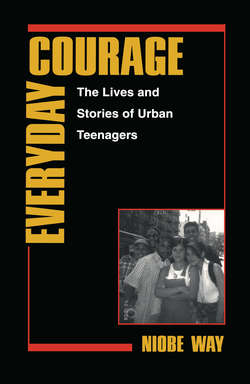Читать книгу Everyday Courage - Niobe Way - Страница 12
На сайте Литреса книга снята с продажи.
Biases and Expectations: What Do We Do with Them ?
ОглавлениеRecognizing that research always reflects the perspectives, ideals, and biases of the researchers need not lead to chaos or nihilistic indeterminacy. Biases allow researchers to maintain order and structure and gain access to meaning. In short, they allow us to avoid chaos. Prejudices are commonly perceived to inhibit truth-finding rather than to enhance it.8 However, biases and prejudices are necessary for understanding. They allow us to take in and engage with the world.9 Biases offer a perspective, and only through having a perspective can we see and possibly understand the vantage points of others.
But what are the implications of such beliefs? Since we always have biases, and, in fact, need biases to perceive different perspectives, what does this mean for researchers? I believe, along with many feminist researchers, that researchers should constantly evaluate and reevaluate their biases, assumptions, and expectations.10 It is when prejudices are not reflected upon, and as far as possible, acknowledged in research that one is likely to end up with findings that do not accurately represent the research participants’ views or perspectives.11 Hans-Georg Gadamer, holding similar views, states: “Every textual interpretation must begin then with the interpreter’s reflection on the preconceptions which result from the ’hermeneutical situation’ in which he finds himself. He must legitimate them, that is, look, for their origin and adequacy.”12 Instead of trying to “forget” one’s biases, prejudices, or expectations, one should engage with and challenge such biases and assumptions and determine their validity and limitations. In order to assess the “adequacy” of one’s biases, it is critical to maintain an openness toward the views held by the participants. Such an openness involves raising questions such as: Are the views held by the interviewee consistent or inconsistent with my expectations? If they are inconsistent, what are the implications for my own preconceptions or understandings? Gadamer warns us:
When we listen to someone or read a text, we discriminate from our own standpoint, among the different possible meanings—namely, what we consider possible—and we reject the remainder which seems to us unquestionably absurd. … We are naturally tempted to sacrifice, in the name of “impossibility,” everything that we totally fail to integrate into our system of anticipations. … [However] the essence of questioning is to lay bare and keep alert for possibilities.13
For sound and meaningful interpretations, it is necessary for the “open” reader to remain receptive to interpretations that at first glance seem “impossible,” “absurd,” or unexpected.
In my own research, I attempted to remain alert to the unexpected. I took note when I was quick to dismiss an element of an interview as unimportant, uninformative, or “wrong,” or when I was confused by an interviewee’s statement. I sought to recognize, question, and challenge my own expectations and assumptions. The purpose of such a process is, once again, not to rid myself of such expectations or pretend that they can be left behind once they have been acknowledged, but to come to the edge of my own knowledge—to ask myself what did I know that, in fact, I did not know? What did I expect that did not appear in the interview? How far does the interview take me into territory that I have not yet charted?
Examples of my own biases include those that stem from my experiences of being a white, middle-class woman in the United States. These biases have led me to perceive the world as one in which power differentials exist between men and women, white people and people of color, and rich and poor people; in each case, the former has more power than the latter. Because of these power differentials, I believe that white women struggle more than white men on both a professional and personal level; that women of color struggle more than white women; and that poor or working-class people, especially those who are women of color, have a particularly difficult time surviving in the world relative to those who are more affluent. Nevertheless, as I listened to urban poor and working-class teenagers speak about their lives and the ways in which they do and do not struggle, I realized that my vision of the world did not include many of their views. Indeed, my understanding of surviving was challenged by various adolescents who had contrasting ideas of what it means to “survive.” Some of the adolescents told me they do struggle but in ways in which I did not expect; others stated that they do not find themselves struggling either in or out of school. Some did not even know why I would expect them to be “struggling.” My expectations that the adolescents in this study, particularly the ethnic-minority adolescents, would speak about struggling to survive, about having to make conscious and strenuous efforts to simply get through each day, were simplistic. Their lives were more varied than I predicted—my biases were not “adequate.”
Throughout my analyses, I reflected upon my expectations and my interpretations. What was I not hearing? What was I not taking into consideration as I made an interpretation? I tried to maintain this reflective stance during my analyses to keep myself open to what I did not know or what my expectations prevented me from seeing. Having an awareness of and an openness to “the possibility that the situation may not fit any pattern of understanding in [my] repertoire”14 led me to more perceptive research findings than would have resulted if I had limited my understanding to those theories and ideas that were familiar to me. This process of continual reflection, I believe, enhanced my ability to understand more fully those to whom I was listening.
